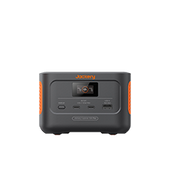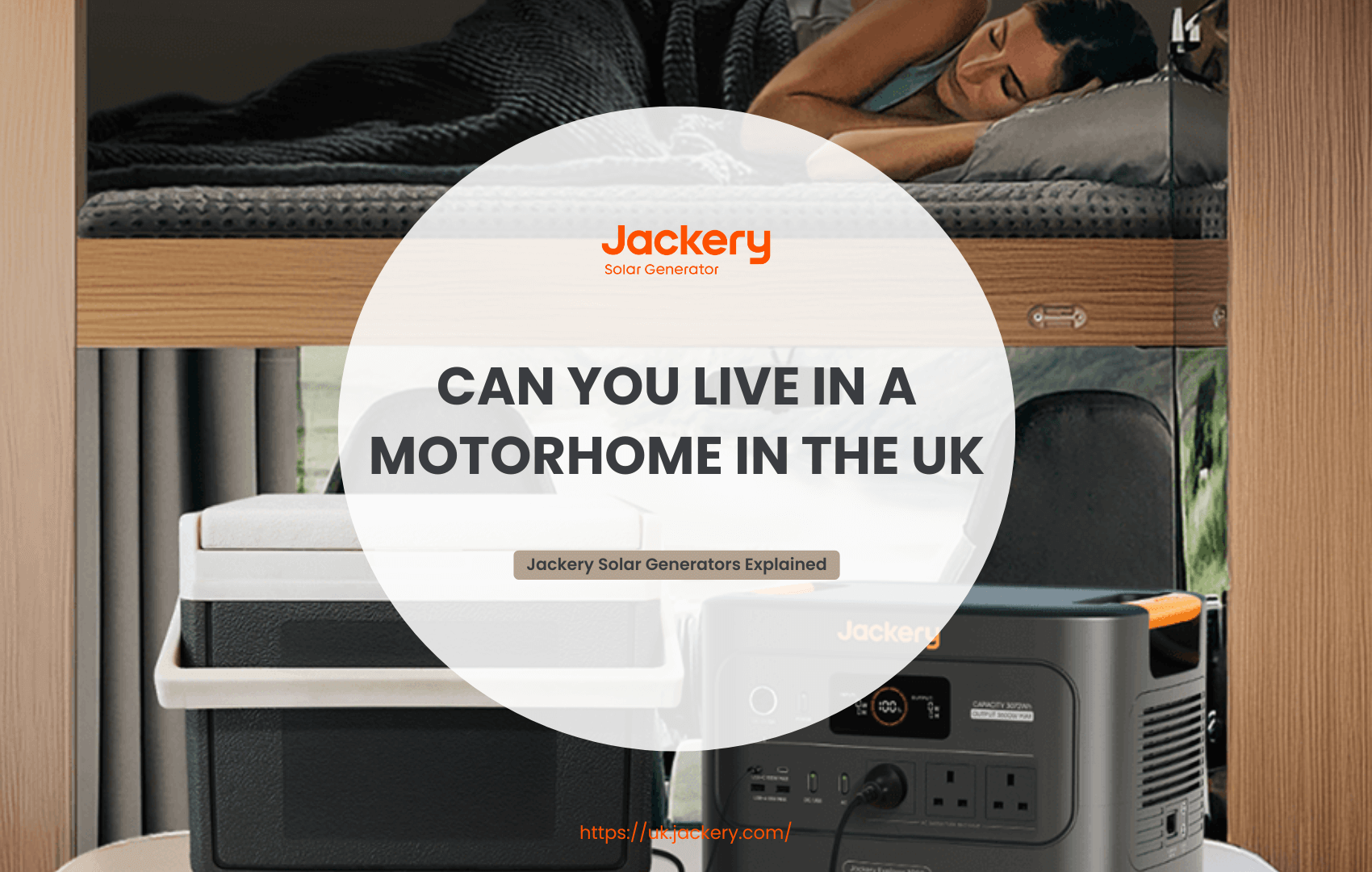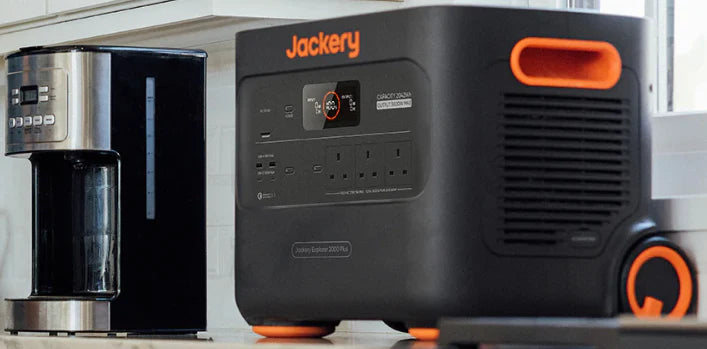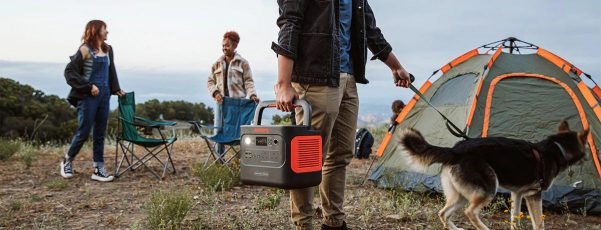Laptop on your lap, coffee steaming in hand, and the morning sun pouring through your van window — this is your office now. Vanlife lets you swap cubicles for coastlines and deadlines for day hikes.
But for all its magic, working on the road isn’t without hiccups. Patchy signals, dead devices, and nowhere to plug in can turn a dream into a headache fast. That’s where smart prep comes in. A reliable battery pack for camping isn’t optional — it’s survival gear for the modern nomad.
In this guide, we’ll cover the real essentials that keep you working, charging, and living well on the move.
Van Life Must-Haves: What You Really Need to Work Comfortably on the Road
Finding the perfect scenic parking spot might not be the priority. Make sure you sleep well, stay connected, eat properly, and keep safe, all while staying mobile. Here's what makes life (and work) on the road not just possible but genuinely enjoyable.
1. Sleep & Comfort: Because Rest Isn’t Optional
A good night’s sleep is the foundation of a productive day, especially when your “office” is also your bedroom.
- Bedding: Don’t settle for thin cushions or awkward sleeping bags unless you’re on a short trip. Long-term van lifers often build a full-size bed frame with a memory foam or hybrid mattress for better support. If space is tight, folding mats or convertible sofas work great, too. Layer with breathable sheets and a good pillow — you’ll thank yourself after the third night.
- Warmth: Weather can be unpredictable, especially at higher elevations or during shoulder seasons. A compact propane heater (with proper ventilation), heated blanket, or thick-down comforter can keep you cozy when temperatures drop. Thermal or insulated window covers help trap heat inside and reduce energy use.
- Ventilation: Good airflow keeps condensation, odors, and stuffy air at bay. A roof vent fan is a popular install for full-time vans, but small USB or battery-powered fans can also help, especially in summer. Cracking a window slightly while you sleep — with a mesh screen to keep bugs out — improves circulation, too.
- Blackout & Privacy: Privacy is peace of mind when you’re parked in busy areas. Blackout curtains, magnetic window shades, or DIY reflective panels block light from streetlamps and the morning sun while also keeping prying eyes out. Bonus: they help with insulation in both hot and cold weather.
2. Power & Remote Work: Staying Charged, Staying Connected
If you’re earning a living from your laptop, power is everything. Running out of battery in the middle of a video call? You can avoid that embarrassing moment.
- Power Setup: A solar panel system combined with a battery pack for camping (like a camping power station) will keep your laptop, phone, camera, and Wi-Fi hotspot running, even in the wild.
- Solar Panels: Mounted on your van’s roof or deployed outside when parked, solar panels are a clean, quiet, and reliable way to harvest energy while off-grid. They work best when paired with a power station or battery storage to give you electricity around the clock.
3. Cooking & Food: Eat Well, Feel Well
You don’t need a gourmet kitchen to eat well on the road — just smart tools and some planning. With a few compact essentials, you can cook healthy, satisfying meals anywhere from mountain campsites to beachside pullouts.
- Stove: A compact electric stove (if your power setup allows) or a portable propane burner is key for cooking inside or out. Look for dual-fuel or foldable models to save space. Some van lifers also carry a small induction cooktop for quick, energy-efficient meals when plugged in or using a strong battery pack for camping.
- Cookware & Tableware: Stick with the essentials: one good pot, one pan, a sharp knife, a cutting board, and basic utensils. Opt for nesting or collapsible cookware to save space. Reusable plates, bowls, and mugs made from lightweight stainless steel or BPA-free plastic are durable and easy to clean.
- Food Storage: A portable 12V fridge is ideal for long trips and hot climates — it keeps food cold without ice and often has adjustable temps for freezing or chilling. For shorter trips, a high-quality cooler with thick insulation does the job, especially when paired with frozen water bottles.
- Water Supply: Clean water is a must. Carry several large jugs (5–10 gallons total), ideally with a spigot or pump for easy access. A simple gravity-fed water filter or a compact UV sterilizer ensures you can refill safely from streams, taps, or public rest stops when needed. Don’t forget a backup bottle for emergencies!

4. Safety & Maintenance: Peace of Mind on Wheels
Unexpected things happen. Having the right tools and safety gear makes the difference between a minor hiccup and a major issue.
- First Aid Kit: Accidents happen, even if you’re just making coffee. A well-stocked first aid kit should include bandages, antiseptic wipes, tweezers, pain relievers, allergy meds, and any personal prescriptions. Consider adding motion sickness pills, bug bite cream, and a digital thermometer for longer trips.
- Fire & Gas Safety: If you're cooking indoors or using propane, fire safety is non-negotiable. Pack a compact but powerful fire extinguisher, and install a smoke alarm and carbon monoxide detector. These small devices are literal lifesavers in enclosed spaces.
- Tools: A reliable tool kit can save you a costly trip to the mechanic. Essentials include screwdrivers, pliers, adjustable wrench, duct tape, zip ties, a tire pressure gauge, and a utility knife. Bonus points if you add a headlamp for hands-free fixes in the dark.
- Emergency Gear: Breakdowns can happen anywhere—often when you least expect them. Keep jumper cables, a portable air compressor, tow straps, a spare tire, and a lug wrench within easy reach. Many van lifers also carry a small jack, roadside triangles, and a power bank with a built-in flashlight for extra security.
5. Hygiene & Personal Care: Staying Fresh Anywhere
You won’t always be near a campground or gym, but that doesn’t mean you have to sacrifice hygiene.
- Portable Toilet: When nature calls, and there’s no public restroom nearby, a composting or chemical toilet becomes a game-changer. Composting models are eco-friendly and odor-resistant, while chemical toilets are compact and easy to empty at designated dump stations. Perfect for remote camping or late-night emergencies.
- Shower Options: A refreshing rinse can make all the difference. Solar shower bags warm up during the day and give you enough water for a quick wash. If you need more pressure, portable pump or battery-powered shower systems work with any water source and offer a more “real shower” experience — great after hikes or beach days.
- Essentials: Keep a small bin stocked with everyday hygiene items: biodegradable wipes, hand sanitizer, toothbrush, toothpaste, biodegradable soap, deodorant, and a microfiber towel. These low-footprint items are easy to store and quick to use on the go.
- Privacy Tent: For outdoor showers, toilet use, or getting dressed in public places, a pop-up privacy tent is a lightweight lifesaver. It folds flat when not in use and sets up in seconds — giving you a private moment even at crowded campsites.
Power That Keeps Up: Recommended Gear
Reliable power is the backbone of van life — especially when your livelihood depends on staying connected. Two standout options are the Jackery Explorer 2000 v2 Portable Power Station and the Jackery Explorer 1000 v2 Portable Power Station, both designed for off-grid work and travel.

The Jackery Explorer 2000 v2 Portable Power Station delivers a massive 2,042Wh capacity and 2,200W output, capable of powering laptops, monitors, mobile routers, drones, mini-fridges, and even power tools — all at once. It charges via solar in just 5.5 hours with 400W solar panels, making it perfect for long-term or high-demand users.
For lighter setups, the Jackery Explorer 1000 v2 Portable Power Station offers a solid 1,070Wh capacity and 1,500W output while weighing only 10.8kg. It’s ideal for powering essentials like your laptop, phone, camera, and lighting, and it recharges in 7.5 hours with 2*Jackery SolarSaga 100W solar panels.
Both units are equipped with LiFePO4 batteries for a longer lifespan (up to 10 years of use), fast AC recharging, and multiple output ports (AC, USB-A, USB-C). Whether you’re editing videos from the forest or taking Zoom calls by the lake, Jackery’s portable power stations offer quiet, clean, and dependable energy — anytime, anywhere.

FAQs About Working from a Van
1. Where do van lifers park?
Vanlifers often park overnight at campgrounds, national parks, rest stops, or designated "stealth camping" spots in urban areas. Apps like Park4Night, iOverlander, and Google Maps reviews are helpful for finding safe, legal places to stay.
2. How do you afford to live in a van?
Many van lifers work remotely as freelancers, digital nomads, or run online businesses. Others take seasonal jobs or work part-time while traveling. Living in a van cuts down major expenses like rent and utilities, making a modest income stretch much further.
3. Is vanlife illegal?
Vanlife isn’t illegal, but where you park can be. Always check local laws — some cities prohibit overnight parking. Respect posted signs, stay discreet, and avoid trespassing to keep things legal and stress-free.
4. How do you convert a van for living?
Van conversions range from DIY builds to professional custom jobs. Key areas include insulation, flooring, a power system (like a battery pack for camping), storage, a bed platform, and ventilation. Start with your budget and must-haves, and build from there.
5. How do you get internet while living in a van?
Wi-Fi hotspots from your phone, mobile data plans, or dedicated 4G/5G routers are common solutions. Some van lifers also use signal boosters or connect at libraries and cafés when needed. Staying online is very doable with a bit of planning.
Wrapping Up
Ultimately, working from a van is about embracing a minimalist mindset, becoming incredibly adaptable, and finding joy in the simple yet profound act of making the world your office. What aspects of this lifestyle intrigue you the most?

































































































